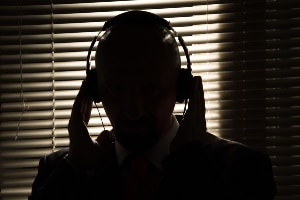Is It Illegal to Record Someone without Their Consent in California?
 It is illegal to record someone else without their knowledge in California while a confidential conversation is taking place. This rule applies to private conversations or telephone calls. This law is enacted under Penal Code 632 PC, in which an individual or party is in violation of this rule if they eavesdrop by recording someone without their consent. While it is illegal under this law to record a private conversation without consent, there are exceptions to this rule. If you feel you may have been recorded illegally in California, you may want to get in touch with an experienced criminal defense attorney who may be able to help your case.
It is illegal to record someone else without their knowledge in California while a confidential conversation is taking place. This rule applies to private conversations or telephone calls. This law is enacted under Penal Code 632 PC, in which an individual or party is in violation of this rule if they eavesdrop by recording someone without their consent. While it is illegal under this law to record a private conversation without consent, there are exceptions to this rule. If you feel you may have been recorded illegally in California, you may want to get in touch with an experienced criminal defense attorney who may be able to help your case.
Having an experienced criminal defense attorney on your team is crucial when understanding the laws for recording someone without consent in California. Attorney Dod of Dod Law is an award-winning criminal defense lawyer in San Diego, California. Attorney Dod understands that trying to navigate the California legal system can be nerve-racking on your own, which is why it is crucial that you partner with a criminal defense attorney if you feel you have been treated unjustly.
How Does Penal Code 632 Characterize Eavesdropping?
Penal Code 632 states that eavesdropping is a crime if the following are true:
- The act was intentional
- The person being recorded did not give any form of explicit consent
- The conversation was confidential
- The act involved the use of an electronic recording device, such as a recorder, to overhear the conversation and record it
California’s criminal law defines a conversation as confidential when at least one person involved in the conversation intended for no one else, aside from those present, to hear what was said. An example of eavesdropping on a confidential conversation would be placing a recording device in a coworker’s office without their knowledge to overhear their meeting with your boss. Whether or not a conversation is deemed confidential will depend on all factors of a particular case.
When Does Penal Code 632 Not Apply to a Conversation?
There are exceptions to the rule of eavesdropping as stated by Penal Code 632. In the case of public conversations and police recording, it can become difficult to determine whether a recording was legal or not.
Public Conversations
If someone was recorded without their consent in a public conversation, it is possible that Penal Code 632 may not apply in this scenario. Whether or not a conversation was deemed public will depend on whether or not it can be proven that there was not someone in the conversation that had a reasonable expectation that the conversation would not be heard by anyone else. This law also does not apply to the following public conversation types:
- Legislative proceedings
- Judicial proceeds
- Executive proceeds
- Administrative proceeds
Hiring a criminal defense attorney with knowledge of the intricate laws in California is crucial to determining whether or not a conversation is to be deemed public or confidential.
Police and Recording Used to Gather Evidence
When a police officer records a conversation, they do not need consent to do this legally. Penal Code 632 does not apply to police and the recording of conversations with an intent to gather evidence. Any evidence obtained by a police officer that was recorded without consent is also permissible in court.
Additionally, in respect to recording someone with the intent of gathering evidence of a crime, private citizens may also legally do this if they are actively part of the conversation and have reason to believe the individual being recorded is involved in any of the following crimes:
- Kidnapping
- Extortion
- Bribery
- Any felony involving violence against another person
Get Help From Experienced California Criminal Defense Attorney
Being accused of a crime can leave you feeling lost and anxious. It may feel like no one is on your side, especially when you end up in a situation in which you have been recorded without your consent. If a recorded conversation is being used as evidence against you, an experienced criminal defense attorney may be able to help you determine whether or not that recording was legally obtained. If it is found that the recording was illegal, that may be beneficial in your case.
Attorney Dod of Dod Law is a talented criminal defense attorney with over 17 years of experience defending clients in California. With the knowledge and experience to know what it takes to build a solid criminal defense case, you can trust that you will be in good hands with Dod Law. For a free case review from an award-winning attorney, fill out this contact form or call (619) 814-5110.
At a Glance
Meet Attorney Dod Ghassemkhani
- Recent Case Results
- San Diego Criminal Defense Bar Association | Named San Diego County’s 2023 Trial Lawyer Of The Year
- Award Winning Criminal Defense Attorney
- The National Trial Lawyers: Top 100 Trial Lawyers
- Over 20 years of criminal defense experience
- 10.0 “Superb” Avvo Rating
